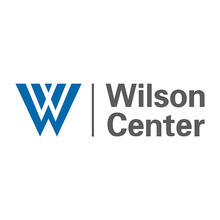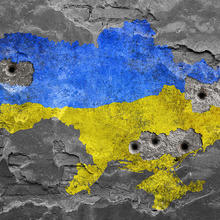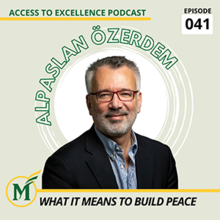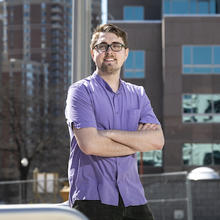- September 26, 2023
In an article published in Focus Ukraine, Dean Alpaslan Özerdem, wrote about the opportunity and need for planning for the reconstruction of Higher Education in Ukraine. Özerdem argues that, "higher education will be needed to keep up with the need for more trained people. No matter how much reconstruction funding is provided, if the country lacks people with the skills to use the help effectively, the reconstruction experience will become a major disappointment for everyone, from donors to national authorities to the war-torn communities themselves."
- September 18, 2023
In an article by the Kyiv Independent, Dean Alpaslan Özerdem reacts to the selection of Penny Pritzker to lead the U.S. efforts in the economic recovery of Ukraine. The article by Elsa Court, published on September 18, 2023, is entitled, Who is Penny Pritzker, new US special representative for Ukraine's economic recovery?
- July 26, 2023
In an interview with the Portuguese newspaper Expresso, Alpaslan Özerdem, dean of the Carter School, identified the critical components of a successful reconstruction of Ukraine. According to Özerdem, the legitimacy of reconstruction rests upon including the needs of the Ukrainian population as a whole. He warned that focusing on the investment priorities of the funding parties, at the expense of the needs of the people who will live in the reconstructed zones, is a recipe for failure. Mental health, culture, and interpersonal connections in divided front-line communities should be priorities when planning reconstruction.
- July 12, 2023
In an earlier piece we discussed how Ukrainians living in front-line areas, the great majority of whom are Russian speakers, see their own nation and how they perceive Russia and Russian citizens. This blog addresses their opinions regarding war and a path to victory and peace.
- June 12, 2023
A lengthy and comprehensive reconstruction effort will be needed to raise Ukraine from the rubble and provide a peaceful living environment for its displaced people. Before postwar reconstruction planning can start in earnest, however, international donors and Kyiv should have a clear understanding of the challenges that may be expected.
- March 13, 2023
On February 24, the one-year anniversary of Russia’s invasion of Ukraine, George Mason University’s Carter School for Peace and Conflict Resolution hosted “One Year After: Ukraine War Analysis and Prospects,” an all-day virtual event to discuss the effects of the war and potential post-war contexts.
The event featured Romantsova Oleksandra, executive director of the Center for Civil Liberties, the first Ukrainian organization to win a Noble Peace Prize. The recognition, which the human rights organization received in 2022, was due in part to their work documenting war crimes against civilians in occupied areas of Ukraine.
- July 25, 2022
Alpaslan Özerdem, dean of the Jimmy and Rosalynn Carter School for Peace and Conflict Resolution explains the keys to effective peacebuilding, whether it concerns the war in Ukraine, gun violence or local issues. And don’t miss the discussions about how an alien invasion could help mend the rift between Russia and the West.
- June 28, 2022
George Mason University Carter School professor Richard Rubenstein attended a workshop conference at the Pontifical Academy for Social Sciences at the Vatican on June 6-7 to discuss peacemaking in Ukraine and other global conflict sites. The conference was organized by the U.N. Development Solutions Network headed by Columbia University professor Jeffrey Sachs.
- May 9, 2022
Despite being more than 5,000 miles away from the war in Ukraine, students at George Mason University’s Carter School for Peace and Conflict Resolution are actively assessing the conflict dynamics, with hopes that their research could improve the situation.
- April 7, 2022
The Carter School has collected articles and seminars written and presented by our faculty to help researchers, peacebuilders, and knowledge seekers understand the scope and impact of Russia’s war on Ukraine. As new resources become available, they will be added to this page.







